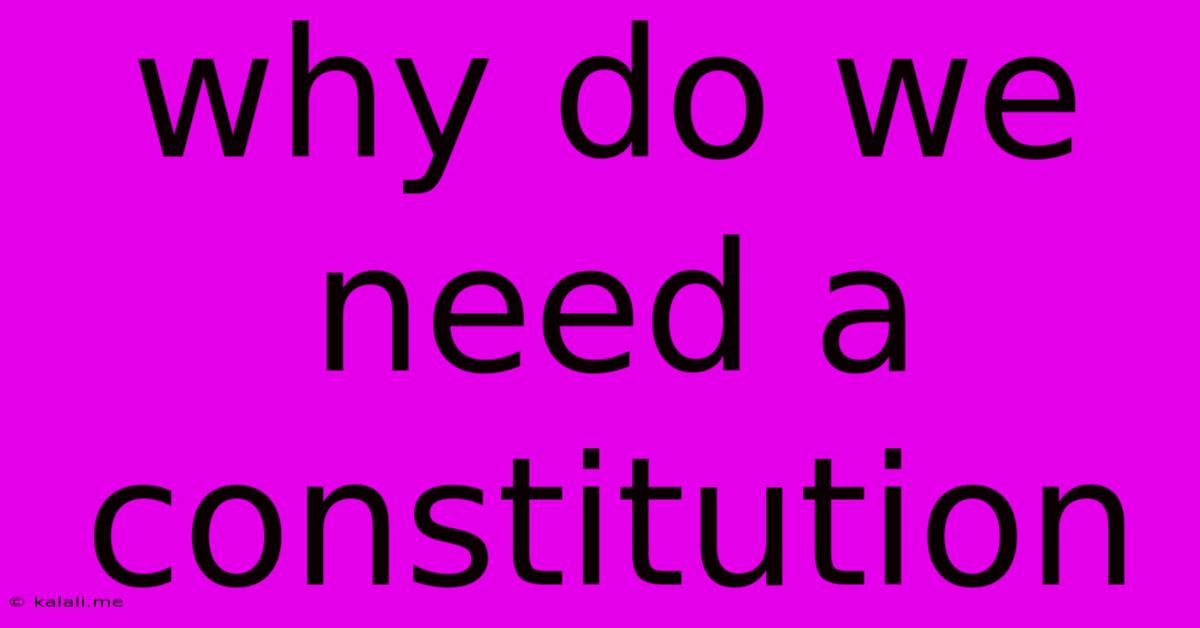Why Do We Need A Constitution
Kalali
Jun 14, 2025 · 3 min read

Table of Contents
Why Do We Need a Constitution? The Cornerstone of a Just and Stable Society
A constitution is more than just a document; it's the bedrock of a nation, the foundational blueprint for a just and stable society. It outlines the fundamental principles and laws governing a country, defining the relationship between the government and its citizens. But why is having a constitution so crucial? This article explores the vital reasons why constitutions are indispensable for any thriving nation.
Protecting Fundamental Rights and Freedoms: At its core, a constitution serves as a guarantor of individual rights and freedoms. It establishes safeguards against government overreach, ensuring that citizens' basic liberties – such as freedom of speech, religion, assembly, and the press – are protected. Without this explicit protection, these rights are vulnerable to the whims of those in power. The constitution acts as a shield, preventing arbitrary infringement on individual liberties. This includes protection against discrimination based on race, religion, gender, or other factors.
Establishing the Rule of Law: A well-defined constitution establishes the rule of law, ensuring that everyone, including the government, is subject to and accountable under the law. This principle prevents tyranny and arbitrary actions by those in authority. Clear legal frameworks, processes, and limitations on power are vital to maintaining order and preventing chaos. The constitution provides the framework for this legal system, clarifying the boundaries of governmental power and the rights of citizens within that system.
Defining the Structure and Powers of Government: Constitutions delineate the structure of government, defining the roles and responsibilities of different branches (legislative, executive, and judicial). This separation of powers is designed to prevent the concentration of power in any single entity, thus mitigating the risk of authoritarianism. By clearly outlining the powers of each branch, constitutions prevent governmental overreach and ensure a system of checks and balances. This intricate balance is crucial for maintaining a stable and democratic society.
Promoting Stability and Predictability: A constitution provides stability and predictability in governance. It sets out the rules of the political game, providing a framework for peaceful transitions of power and conflict resolution. This predictability fosters economic growth and investment, as individuals and businesses can operate with confidence knowing the basic rules of the game won't change arbitrarily. Long-term planning becomes possible when the fundamental laws of the land are clearly defined and consistently enforced.
Providing a Mechanism for Change: While constitutions aim to provide stability, they also recognize the need for adaptation to changing circumstances. Most constitutions include provisions for amendment, allowing for gradual changes in response to societal evolution. These mechanisms for change ensure that the constitution remains relevant and responsive to the needs of the people it serves, while preserving its core values and principles. This adaptability is crucial for the long-term survival and effectiveness of the constitution itself.
Enhancing Legitimacy and National Unity: A constitution provides a shared foundation for national unity. It acts as a unifying document, embodying the collective values and aspirations of a nation. By establishing a common set of rules and principles, a constitution fosters social cohesion and a sense of shared national identity. This sense of shared purpose is vital for overcoming internal divisions and maintaining a stable and unified society. Public trust and confidence in the governmental system are significantly enhanced when it operates under a well-defined constitution.
In conclusion, a constitution is not merely a piece of parchment; it's the lifeblood of a well-functioning society. It guarantees fundamental rights, establishes the rule of law, structures government, fosters stability, and provides a mechanism for change. Without a constitution, the risk of tyranny, instability, and social breakdown is significantly increased. Its presence is essential for the creation and maintenance of a just, equitable, and prosperous nation.
Latest Posts
Latest Posts
-
What Is The Lcm Of 36 And 45
Jun 15, 2025
-
Compound Interest Formula Excel Between Two Dates
Jun 15, 2025
-
Difference Between Winter And Summer Olympics
Jun 15, 2025
-
The Missing Number In The Series 1 4 27
Jun 15, 2025
-
Least Common Multiple Of 60 And 72
Jun 15, 2025
Related Post
Thank you for visiting our website which covers about Why Do We Need A Constitution . We hope the information provided has been useful to you. Feel free to contact us if you have any questions or need further assistance. See you next time and don't miss to bookmark.